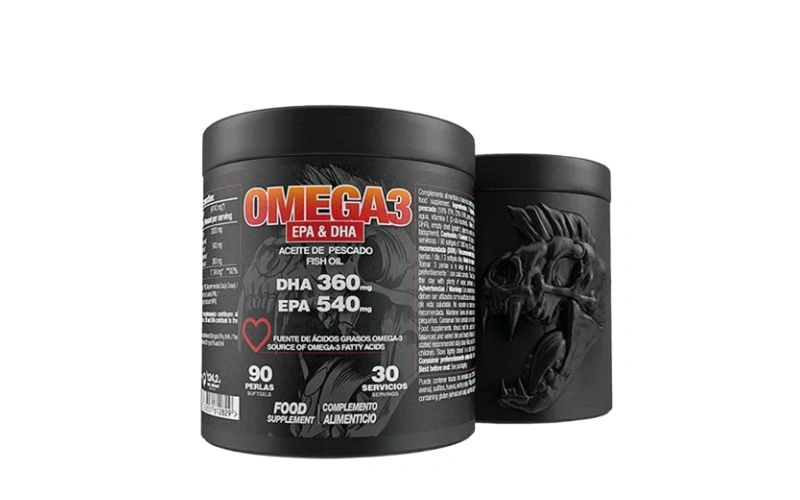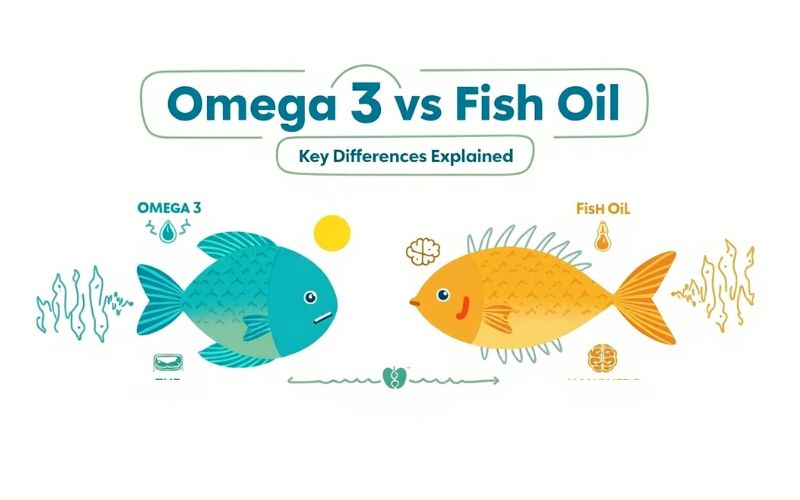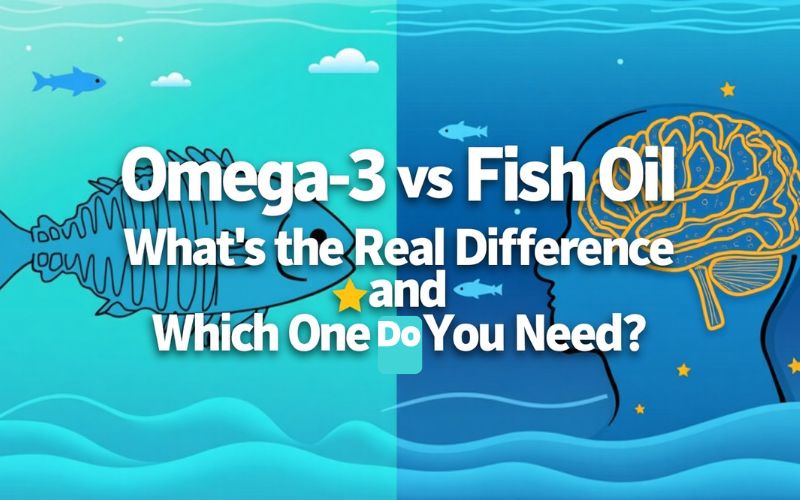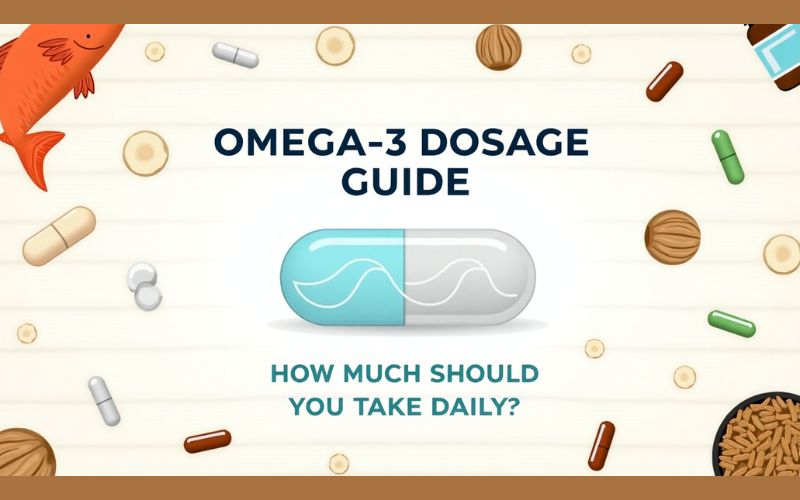Omega-3 fatty acids are essential nutrients that support heart health, brain function, joint mobility, and more. But for many people in Pakistan who prioritize halal-certified products, choosing the right omega-3 supplement can be confusing. With so many options on the market, how do you make sure the product is both effective and halal?
This guide breaks down everything you need to know about how to choose halal omega-3 in Pakistan, ensuring you make a well-informed, health-conscious, and religiously compliant decision.
Table of Contents
Why Omega-3 is Important for Your Health
Omega-3 fatty acids are a group of polyunsaturated fats, primarily found in fish oil, flaxseeds, and certain algae. These healthy fats offer numerous benefits:
- Supports cardiovascular health by reducing triglycerides and improving blood flow
- Boosts brain function and may help with mood, memory, and focus
- Reduces inflammation, especially in joints and muscles
- Promotes eye health, particularly in aging adults
For people who don’t consume enough fatty fish in their diet, omega-3 supplements are a practical solution.
The Challenge: Finding Halal Omega-3 in Pakistan
The primary source of omega-3 supplements is fish oil, which may be processed using non-halal methods such as encapsulation with gelatin derived from non-zabiha animals. Additionally, not all manufacturers disclose how the fish oil is sourced or processed.
This creates a challenge for those seeking how to choose halal omega-3 in Pakistan, as transparency and halal certification are essential factors.
Key Factors to Consider When Choosing Halal Omega-3 in Pakistan
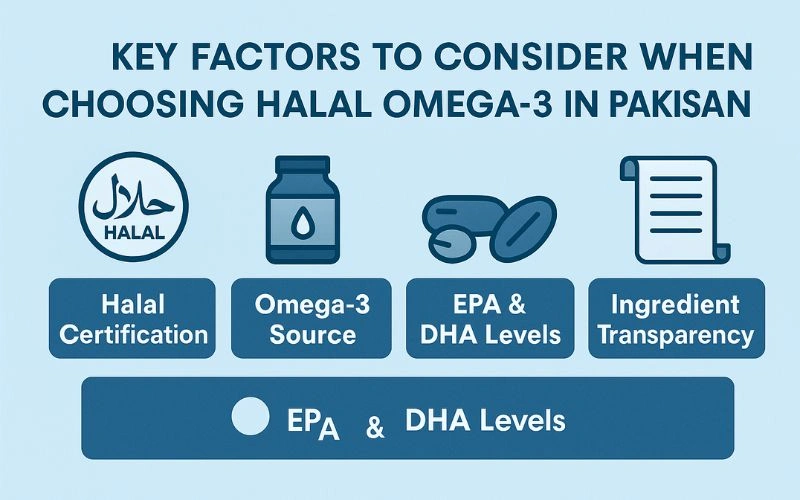
When shopping for halal omega-3 supplements in Pakistan, keep the following points in mind:
1. Check for Halal Certification
The most reliable way to ensure your omega-3 supplement is halal is by looking for a verified halal certification from a reputable organization. This certifies that:
- The gelatin used in capsules is derived from halal sources
- The production process adheres to Islamic guidelines
- No alcohol or non-halal ingredients are used during extraction or formulation
Look for certifications from bodies like SANHA, JAKIM, or IFANCA.
2. Source of Omega-3
There are different sources of omega-3 used in supplements:
- Fish oil – Most common and typically contains EPA and DHA
- Krill oil – A marine source, but halal status is controversial
- Algae oil – A vegan and halal-friendly source
Algae-based omega-3 is naturally plant-derived and usually considered halal, making it a safe choice for vegetarians and Muslims alike.
3. Encapsulation Material
Many supplements are enclosed in gelatin capsules, which may come from either halal or haram sources. If the product doesn’t clearly mention “halal gelatin” or specify its origin, it’s best to avoid it.
Choose softgels or capsules labeled with “halal gelatin” or “veggie caps” made from cellulose, which are plant-based and halal.
4. Purity and Quality Testing
Beyond religious compliance, product safety is critical. Choose a brand that provides:
- Third-party lab testing to ensure purity and potency
- Certificate of Analysis (CoA) confirming no heavy metals or toxins
- Good Manufacturing Practices (GMP) certification
These indicators show the brand’s commitment to transparency, quality, and consumer safety—an essential part of EEAT (Expertise, Experience, Authoritativeness, and Trustworthiness).
Recommended Halal Omega-3 Sources in Pakistan
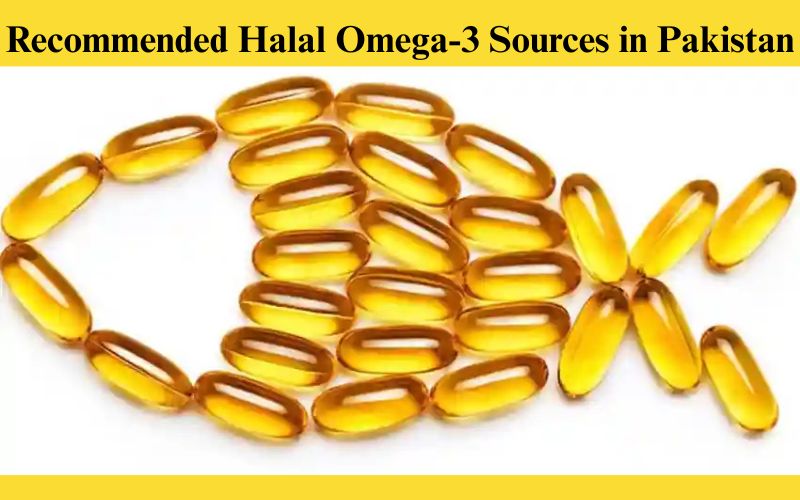
Several reputable halal-certified omega-3 brands are now available in Pakistan, including:
-
Qn Omega 3 Fish Oil (halal-certified, premium fish oil)
-
Omega 3 – 100caps (vegan, algae-sourced DHA)
-
Tri-omega 3-6-9 (tested for purity and potency)
Before purchasing, always verify the label or check the product details for halal certification.
How to Read Supplement Labels for Halal Compliance
Understanding how to choose halal omega-3 in Pakistan also involves being able to read and understand supplement labels. Here’s what to look for:
- Halal logo from a certification body
- Source of gelatin (look for halal bovine or plant-based)
- Type of omega-3 (EPA, DHA, ALA, or sourced from algae)
- Third-party testing or GMP labels
If anything is unclear, don’t hesitate to contact the manufacturer or retailer for confirmation.
Common Mistakes to Avoid
When choosing a halal omega-3 supplement, avoid these common errors:
- Assuming all fish oil is halal – It’s not, unless certified
- Buying from unverified sources – This increases the risk of counterfeit products
- Ignoring gelatin origin – This is one of the most common sources of hidden haram ingredients
- Focusing only on price – Cheaper isn’t always better; quality and halal compliance matter more
Understanding these pitfalls will help you make smarter and more ethical choices.
FAQs About Choosing Halal Omega-3 in Pakistan
Q1: Are all omega-3 supplements halal?
No, not all omega-3 supplements are halal. Many use non-halal gelatin or alcohol in processing. Always check for halal certification.
Q2: Is vegan omega-3 considered halal?
Yes, vegan omega-3 sourced from algae is generally halal and a great option for vegetarians or those seeking plant-based alternatives.
Q3: Where can I buy halal omega-3 supplements in Pakistan?
You can purchase halal omega-3 supplements from reputable health stores or online platforms like https://nutritionalworld.com.pk, which offer verified halal-certified products.
Q4: How do I know if a supplement is genuinely halal?
Look for a halal certification logo, check the ingredients, and verify the source of gelatin. When in doubt, contact the manufacturer.
Q5: What is the best source of halal omega-3 for kids?
Algae-based omega-3 is safe, effective, and halal, making it an excellent choice for children, especially those who don’t eat fish.
Conclusion
Choosing the right omega-3 supplement is crucial for your health, but it’s equally important to ensure it aligns with your halal dietary standards. By focusing on halal certification, source transparency, and product quality, you can confidently make the best choice.
Now that you know how to choose halal omega-3 in Pakistan, make sure your next supplement purchase supports your health and your values.
For high-quality, halal-certified omega-3 supplements in Pakistan, visit https://nutritionalworld.com.pk and explore a range of trusted products delivered to your doorstep.















